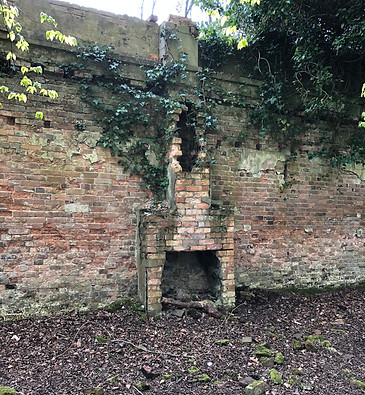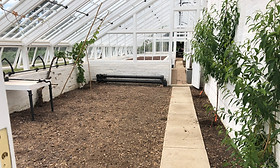
Vineries and Kitchen Gardens
On the island today, alongside part of the track known as Middle Street, is a long, standalone wall with what looks like fireplaces and doorways in it. It has long been a source of curiosity for visitors. In the Victorian times, this long wall was part of a ‘hothouse’; similar to a green house but with other heat source apart from the sun.

North side of the wall

While Brownsea's hot houses are in ruin, Kingston Lacy estate, also in Dorset, has examples of hot houses, which are very similar to what would have been on Brownsea.
The north side of the wall (closest to Middle Street) had living quarters for the men who worked there, as well as store rooms, potting sheds and boilers. This accommodation for the workers was called a ‘bothy’. The men were single and young, and had to work hard to keep boilers hot to keep the greenhouses warm.

Inside Kingston Lacy's hot house, on the 'Bothy' side

Bothy fireplace
The brick wall supported the glasshouses on the south of it, to allow the sun in. This, along with the heating inside the glasshouses, meant gardeners could grow exotic fruits, like grapes, peaches, oranges and nectarines, as well as some exotic plants and flowers. Most of the produce grown here was used in the castle, but some was sold in London.
_JPEG.jpeg)
South side of the wall

Pipes for heating on south side


Kingston Lacy's glasshouses
Around the corner from the long wall, towards the Lily Pond, is a stone semi-circle seat. From sitting on the seat, you get a view of what used to be the kitchen garden, which grew vegetables and other fruits, such as strawberries, raspberries and currants, for the castle. There was also an orchard with apple, plum, cherry and pear trees. From this side of the wall, you can also spot some of the pipes which would have been inside the hot houses, which were used for heating as well as watering the plants.

View from seat of Old Kitchen Garden
Gallery




